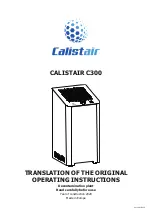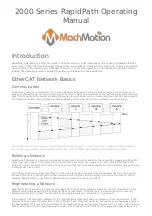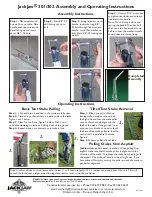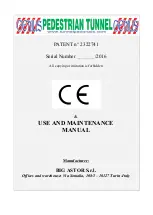
Instruction Manual
1. Marking
VisuNet FLX – System with Enclosure
Remote Monitor RM-320S-*
Personal Computer PC-320S-*
Equipment protection level Gc
ATEX certificate: PF 21 CERT 6290 X
ATEX marking:
1
II 3G Ex ec [ic] IIC T4 Gc
Equipment protection level Dc
ATEX certificate: PF 21 CERT 6290 X
ATEX marking:
1
II 3D Ex tc [ic] IIIC T85°C Dc
VisuNet FLX – System with Enclosure
Direct Monitor DM-320S-*
Equipment protection level Gc
ATEX certificate: PF 21 CERT 6290 X
ATEX marking:
1
II 3G Ex ec IIC T4 Gc
Equipment protection level Dc
ATEX certificate: PF 21 CERT 6290 X
ATEX marking:
1
II 3D Ex tc IIIC T85°C Dc
The *-marked letters of the type code are placeholders for versions of the
device.
Fuchs Group
Lilienthalstraße 200, 68307 Mannheim, Germany
Internet: www.pepperl-fuchs.com
2. Validity
Specific processes and instructions in this instruction manual require
special provisions to guarantee the safety of the operating personnel.
3. Reference to Further Documentation
Observe laws, standards, and directives applicable to the intended use
and the operating location. Observe Directive 1999/92/EC in relation to
hazardous areas.
The corresponding datasheets, manuals, declarations of conformity, EU-
type examination certificates, certificates, and control drawings if
applicable (see datasheet) are an integral part of this document. You can
find this information under www.pepperl-fuchs.com.
Due to constant revisions, documentation is subject to permanent change.
Please refer only to the most up-to-date version, which can be found under
www.pepperl-fuchs.com.
4. Target Group, Personnel
Responsibility for planning, assembly, commissioning, operation,
maintenance, and dismounting lies with the plant operator.
The personnel must be appropriately trained and qualified in order to carry
out mounting, installation, commissioning, operation, maintenance, and
dismounting of the device. The trained and qualified personnel must have
read and understood the instruction manual.
5. Intended Use
The device is only approved for appropriate and intended use. Ignoring
these instructions will void any warranty and absolve the manufacturer
from any liability.
The VisuNet FLX Systems are designed for Zone 2/22 and non-Ex
applications. The different mounting and configuring options lead to the
highest application flexibility. Due to a fully modular design, the new
platform, which is geared to the needs of the (petro-) chemical and
pharmaceutical industries, the HMIs can be configured to fit exactly and
enables simple and fast adjustments in the field.
Use the device only within the specified ambient temperature range.
Use the device only within the specified ambient and operating conditions.
Take the intended use of the connected devices from the corresponding
documentation.
Take the intended use of the installed devices from the corresponding
documentation.
The device is an electrical apparatus for hazardous areas.
The device is not suitable for separating hazardous areas.
Devices for which specific conditions of use apply have the X marking at
the end of the certificate number.
Only use the device stationary.
6. Improper Use
Protection of the personnel and the plant is not ensured if the device is not
used according to its intended use.
The device is not suitable to separate intrinsically safe circuits from non-
intrinsically safe circuits.
The device is not suitable for separating hazardous areas.
7. Mounting and Installation
Prior to mounting, installation, and commissioning of the device you
should make yourself familiar with the device and carefully read the
instruction manual.
Do not stay below the open device. In order to avoid personal injuries or
property damage, make appropriate provisions for the mounting and
maintenance procedures.
Use mounting materials which are suitable to secure the device safely.
Use mounting materials that fit the nature of the mounting surface.
Only use accessories specified by the manufacturer.
Mount the device in a weatherproof location.
Ensure that the operating location has a sufficient floor load capacity.
If mounting the enclosure on concrete use expansion anchors. When
mounting the enclosure to a steel framework use vibration resistant
mounting material.
Ensure that all fasteners are present.
Observe the tightening torque of the screws.
Protect the device against long-term or excessive mechanical vibrations.
The device is heavy. In order to avoid personal injuries or property
damage, make appropriate provisions for the mounting procedure.
Do not mount the device at locations where an aggressive atmosphere
may be present.
Do not damage the breather drain.
Do not cover the breather drain.
Observe the installation instructions according to IEC/EN 60079-14.
Observe the installation instructions according to IEC/EN 60079-25.
If the device has already been operated in general electrical installations,
the device may subsequently no longer be installed in electrical
installations used in combination with hazardous areas.
Ensure that the equipotential bonding connections are in good condition,
and are not damaged or corroded.
Ensure that the terminals are in good condition and are not damaged or
corroded.
When connecting intrinsically safe devices with intrinsically safe circuits of
associated apparatus, observe the maximum peak values with regard to
explosion protection (verification of intrinsic safety). Observe the
standards IEC/EN 60079-14 or IEC/EN 60079-25.
Provide a transient protection. Ensure that the peak value of the transient
protection does not exceed 140 % of the rated voltage.
The device must be installed and operated only in a controlled
environment that ensures a pollution degree 2 (or better) according to
IEC/EN 60664-1.
The device must be disconnected from the power supply prior to
installation and maintenance. The power supply may be activated only
after all the circuits required for operation have been fully assembled and
connected.
Only connect a device that is in accordance with IEC/EN 60950-1 and is
designed as safety extra-low protective voltage (SELV) system.
Protect the circuit against overvoltage (e. g., lightning).
The device provides a grounding terminal to which an equipotential
bonding conductor with a minimum cross section of 4 mm² must be
connected.
Requirements in Relation to Intrinsic Safety
If circuits with type of protection Ex i are operated with non-intrinsically
safe circuits, they must no longer be used as circuits with type of
protection Ex i.
Observe the maximum values of the device, when connecting the device
to intrinsically safe apparatus.
Keep the separation distances between all non-intrinsically safe circuits
and intrinsically safe circuits according to IEC/EN 60079-14.
Observe the compliance of the separation distances between two
adjacent intrinsically safe circuits according to IEC/EN 60079-14.
Circuits of intrinsically safe apparatus can be led into hazardous areas,
whereby special attention must be paid to maintaining separation
distances to all non-intrinsically safe circuits according to the requirements
in IEC/EN 60079-14.
Observe the grounding requirements for type of protection Ex i according
to IEC/EN 60079
‑
14.
For intrinsically safe circuits, the dielectric strength of the insulation against
other intrinsically safe circuits and against the shield must be
at least 500 V according to IEC/EN 60079-14.
Equipotential bonding must be achieved along the intrinsically safe
circuits.
Requirements for Cable Glands
Install the cables and the cable glands in accordance with
IEC/EN IEC 60079-0 and IEC/EN 60079-14.
Only use cables and connection lines with a temperature range
appropriate to the application.
Use only one connection line per opening.
Use only one conductor per terminal.
Adjust the sealing element of the cable gland to the diameter of the cables
and connection lines used.
Observe the tightening torque of the cable glands.
DOCT-7048C / 2021-10
1 / 2




















